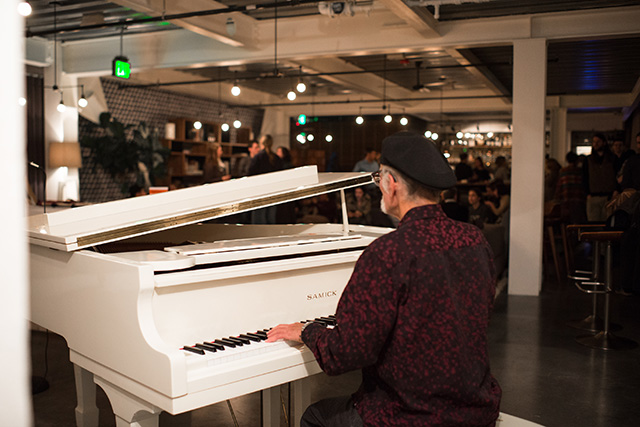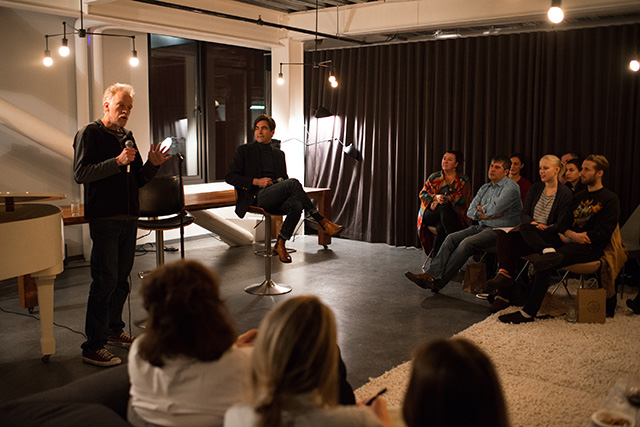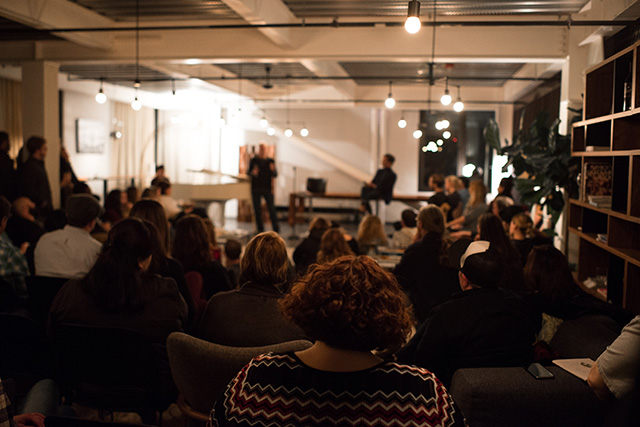Jody Hall asks if I’m on the goodship, and it takes me a minute to realize that she’s asking if I’m stoned. “The Goodship” is the name of Hall’s high-end edibles company and, it turns out, how she refers to getting high. I am on the goodship, I tell her. An hour earlier, I’d eaten 40 milligrams of THC candy and taken more than a few bong hits. That’s what the night was about: getting stoned, and controlling time.
This was the Goodship Academy of Higher Education, a lecture series presented by Hall’s edibles company and hosted at the Cloud Room, a hip coworking space in a Seattle neighborhood filled with million dollar condos and 20 dollar bowls of ramen. The room, like the neighborhood, is lush. There was a spread of gourmet munchies—fine cheese, dark chocolate, cured meats. A few dozen attractive, well-dressed humans drank cocktails and lounged on the plush shag rug; a man in a beret played a white grand piano in the corner. A sketch artist drew the evening unfolding around him. While Jody Hall herself is modest—even here she wore jeans and a Goodship hoodie—you could tell there was money in the room. It was very white.

The next Higher Education lecture is scheduled for December 9.
One hundred people had gathered for a lecture entitled, “Altered States: Can We Control Time?” by MacArthur genius and local scientist Dr. Mark Roth. This was the third such event presented by the Goodship, what they call “a heady lecture series under heady influence.”
The idea is to listen to a far-out talk while you’re fucked up on pot. It’s like college, but you don’t have to pretend you’re not stoned. Attendees are instructed to come “pre-boarded,” thanks to Seattle’s law against consuming marijuana in public, and there was nary a one-hitter or a vape pen in sight. You’d have no idea that the room was full of very high people if you just stumbled upon it.
Until, that is, you started talking to them.
There are certain challenges to interviewing stoned people. They tend to get paranoid when a stranger sticks a recorder in their face. Plus, they’re a little boring. When I asked people what brought them there, almost everyone said the same thing. “It seemed cool,” said a bearded man in all black. “Although I go to most things stoned, so it’s not that different. The free food is nice.”
The free food was nice. The next guy I spoke to also mentioned this. He was in his mid 20s, wearing a gray hoodie and growing what looked liked a Movember mustache. He didn’t want to give his name because he works as a federal contractor, and his girlfriend shook her head and edged away when I asked for hers. “I wish I’d dressed up,” Movember said, and his girlfriend looked down at her own hoodie and nodded. They’d also come because it seemed cool, but now that they were there, they felt a little out of place. I knew the feeling. As my 40 mgs of THC kicked in, it became increasingly difficult to approach strangers, and I was having trouble remembering my questions. I asked someone why she’d come and then asked her again. “Seemed cool,” she said both times.

Cannabis enhances creativity, and can be conducive to discussing heady ideas.
To Hall, this event is about more than being cool: It’s about making connections. Connections. That’s a word she uses often—exactly 17 times during our 30 minute interview the day before.
“I think people are starving for connection. That’s a big reason I went into this. We’re more social than we’ve ever been,” she told me, pointing to her phone on the table between us, “but we’re not social at all. It’s empty. It’s hollow. We’re craving connection.”
But this is also a business, and Hall knows business. She worked in marketing in the early days of Starbucks, back when they were a small Seattle company introducing people to the words “latte” and “cappuccino.” Hall helped turn Starbucks into a global brand, and she still believes in its vision and its tactics.
“I grew up building brands organically,” Hall said. “Starbucks didn’t spend a dime on advertising. We created things that the media liked and got a lot of publicity. That’s was my job.”
It’s still her job, but instead of convincing people to spend $5 on coffee, she’s marketing pot.
Events like this, she hopes, will help grow the Goodship into more than just an edibles company. And judging from the other reporters there, it’s clearly a good way to get press. But social justice is also important, Hall tells me. She’s not blind to the fact that she’s making a business selling weed when other people—mostly poor people and brown people—are rotting away in jail for that very act. And she wants to help. Practically, she says, this could mean lobbying legislatures or setting up defense funds, though the Goodship doesn’t currently have anything in the works.
“I really believe strongly that we have got to give back in a meaningful way,” she said. “Especially to the people whose backs we’re building this industry on. Let’s face it, most of us are white.”
Before the lecture starts, I check out the food, which is going predictably fast in a crowd full of stoned people. Well, not all stoned people. I spoke to a surprising number of people who were not on the goodship, and when I asked why they came, they said the lecture sounded interesting, that they were curious about time control. It seemed like a waste—why take up space at a cannabis-fueled lecture if you’re not on cannabis?—but once the lecture started, I could see the advantages of a clear mind.

Is time just an illusion?
Mark Roth, the speaker for the evening, was introduced by Hall and Greg Lundgren, a local art star and restaurateur.
“We were thinking about what pot culture could be, and what it should be,” he said, “and we thought, it’s fun to think of big ideas while you’re high. So that’s what we’re doing.”
Roth certainly does have big ideas. He studies suspended animation—a fugue state somewhere between living and dying, from what I could tell, where time ceases to exist for the one experiencing it.
“Time is really change,” Roth said. “So if we don’t have change, time is meaningless.”
To induce this state, Roth injects mice with small amounts of hydrogen sulfide to reduce their metabolic rate. He thinks there is practical application for humans as well, like after a heart attack or stroke to prevent further damage.
Roth looks every bit the scientist, with hair sticking up from his head, old sneakers and a drooping, white mustache. He begins by talking about the twin paradox—a thought experiment in which someone is sent into deep space on a high-speed rocket while his identical twin remains on earth. When space twin gets back to earth, he’ll have aged less than his brother at home. The point is that time is relative, and by using things like hydrogen sulfide to induce suspended animation, we can control it.
At least, I think that was the point. I got distracted by the light bouncing off Greg Lundgren’s hair at the front of the room. How does he get it so shiny?, I wrote in my notebook. Is he related to Greg Louganis?
I tuned back in when Roth went into a detailed explanation of what happens to the body during a heart attack. You could hear the room grow itchy as he described muscles contracting, blood pulsing. People shifted around in their seats and groaned under their breath, as though the weed was making them more squeamish, or making the image of a heart attack more real.

It’s like college, but you don’t have to pretend you’re not stoned.
Throughout the lecture, some people seemed attentive, able to take notes and hold onto concepts. Others closed their eyes and leaned into deep couches, maybe contemplating suspended animation, sure, or maybe contemplating pizza.
“What do you think of the space time continuum?” Lundgren asked.
“I don’t,” Roth said after a pause. He was not on the goodship.
The audience asked questions about meditation and hibernation and whether or not toxins in the environment could alter our perceptions of time. Afterwards, I was pretty sure I learned something, although I wasn’t quite sure what. I caught up with the federal contractor before he and his girlfriend headed out the door.
“Did you follow that?” I asked him.
“Oh, yeah,” he said before pausing for a minute. “It was about space travel, right?”
Later that night, after I got back to my tiny studio apartment, my neighbor came over, and I told her about the lecture. I was out of fine charcuterie and the piano player quit, but there was weed, and so we did what stoners do: We smoked, enjoying a wide-ranging conversation about time and relativity and how pot culture is changing and we’re not sure where we fit into it. We also enjoyed the act: the inhale, the exhale, the room filling up with smoke as we passed a pipe back and forth. This was the experience Jody Hall tries to create—exploring ideas, making connections—and I found it, the goodship, right at home.


















